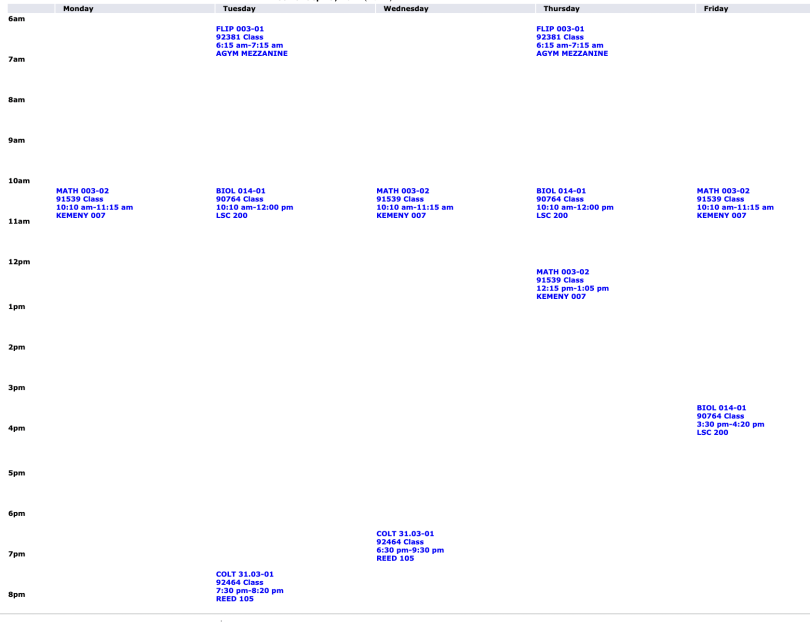

Joanna Jou


Introducing my Freshman Fall Classes
As I am entering week 3 of my first term at Dartmouth, let's take a look at the three classes I am taking this fall.
For context, students typically take three courses a term (with some students taking two or four classes) to total up to the required 35 credits upon graduation. Inside the 35 credits, it includes not only your major(s) and/or minor(s) requirements, but we also have to fulfill Distributive and World Culture requirements. As a college promoting the liberal arts curriculum, these requirements encourage exploring different disciplines that students have not studied before Dartmouth; they are also helpful in gaining a comprehensive understanding of the world not limited to one area of study (so you dabble in a bit here and there across the broad spectrum of specialties). As a first-year, we are advised to not think too much about fulfilling our distribs (Dartmouth lingo for the Distributive/World Culture requirements since it's quite a mouthful) because any course should be able to fulfill some area inside the requirement whether it be the Distributives, World Culture, or even both portions.
Aside from the 35 credits, Dartmouth also has a language and P.E requirement. Before the Class of 2026, students were able to be exempt from taking a language course at Dartmouth if they had pre-matriculation credits from either previous exams taken in high school such as AP or IB. However, as a '26, all students must take at least one language course and follow one of the three paths offered: 1) to students with either no background in a language other than English, 2) demonstrated level equivalency in a language other than English and is also taught at Dartmouth, or 3) demonstrated level equivalency in a language not taught at Dartmouth/proficiency at their native tongue that is not English. The language requirement can be fulfilled not only through classes at Dartmouth, but also on study abroads, which definitely makes taking a new language a lot more appealing. On the other hand, over the span of four years, all students are required to have 3 physical education and/or wellness credits that can be fulfilled through a variety of offerings by the college such as club sports, dance groups, varsity sports, swim classes, snowsports, or group fitness classes - by this requirement, you can really tell that Dartmouth heavily promotes its students to appreciate the outdoors and to get physical!
This fall, I am taking Calculus, Poetry After War, and Physiology; I also decided to enroll in a P.E class called Whole Body Fitness. You may be thinking that 3 courses (+1 PE) a term is pretty light, but on a term system, we are given what is typically taught in a semester of 15-17 weeks into a span of 10 weeks, which means our classes are pretty fast-paced and require a lot of our attention to soak in the material. Here is a little background on each academic class I am taking:
MATH 3 Calculus - A single-variable calculus course for students who've had some background in calculus before; this class takes topics seen in AP Calculus AB into greater depth. Although this class meets for lectures only three times a week, there are x-hours (an additional class period each week that is used at the professor's discretion). For MATH 3, we use our x-hours for group assignments, which means my schedule consists of an additional period of this class - totaling up to MATH 3 classes four times a week. Additionally, I dedicate around an additional two hours each day outside of class to my math homework and readings.
COLT 31.03 Poetry After War - A discussion-based course inside the Comparative Literature department that focuses on reading and analyzing poetry by poets who lived through totalitarian regimes inside Russophone and German cultures. This class meets once a week for three hours, but includes heavy readings outside of class while using x-hour on occasions; thus, although I am only scheduled officially to come to this class once a week (sometimes twice), I still have to dedicate a lot of my time outside of class for my readings, short papers, and discussion posts.
BIOL 14 Physiology - Covering the topics from human, animal, and plant physiology, we examine the body's anatomy and systems through lectures and labs on an integrative level of how a variety of conditions can affect different organisms and their mechanisms. While this class meets twice a week with x-hours always used (a total of 3 times a week), I still have to add in lab time, which is an additional four hours of my week. This class is also heavy on memorization and application, so I spend a good amount of my time digesting the information lectured and trying to make sense of it outside of class.

Posts You Might Like


Here's a list of some things I'm looking forward to this fall!


Read more about the Phil 1.08 Philosophy of Time and Time Travel class!


Spending my summer off term getting my CNA license in Boston!


Ciao Bella! Let me explain how I am completing the Dartmouth language requirement one row at a time.


Read more about the Ling 1 Introductory Linguistics class!


Read more about the Spanish 9 Advanced Culture and Conversation class!


What orientation is like for first years at Dartmouth!


Come learn about the classes I'm taking this summer!
